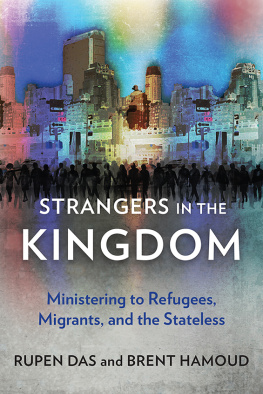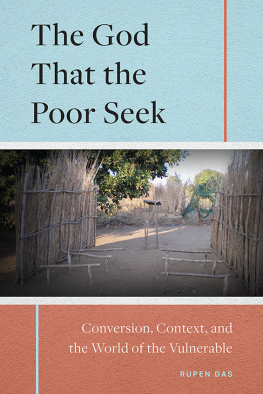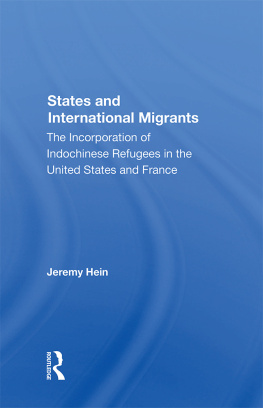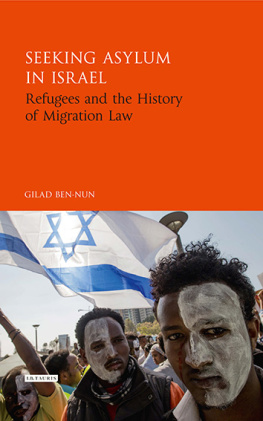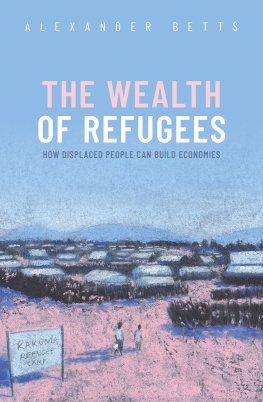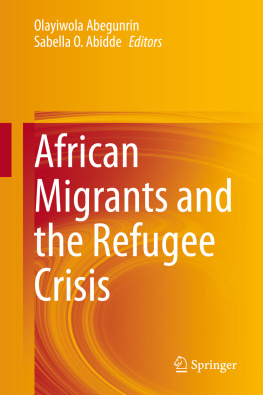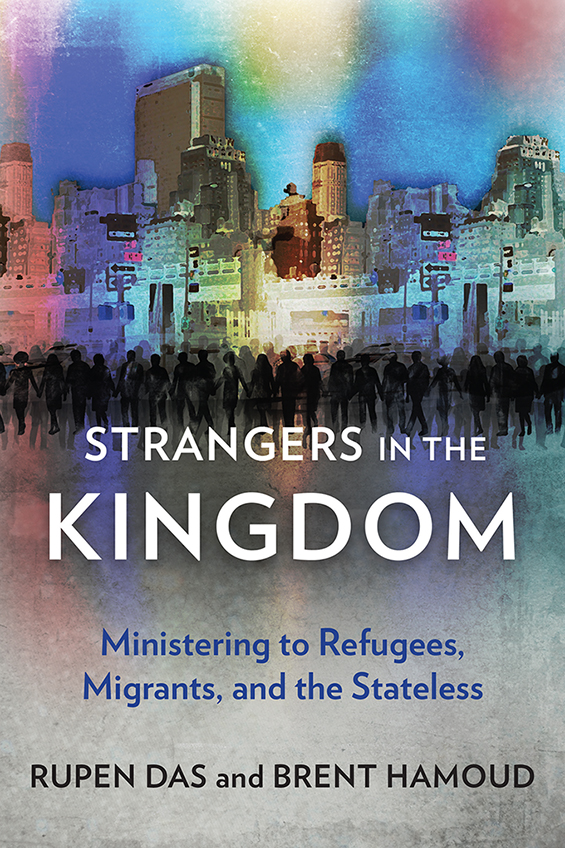A rich resource at a critical time in history, Strangers in the Kingdom walks the fine line between praxis and theological reflection, weaving its content into a relevant whole. It is obvious that Das and Hamoud approach this conversation with experience, and because of that, they are able to move the conversation beyond simple platitudes, compassionate emotions and biblical proof texting. This is a theological treatise that needs to be read no matter where you stand in the socio-political positioning of the day. More importantly it is a book that places demands on you if you are truly going to follow Jesus.
Gary V. Nelson, PhD
President, Tyndale University College & Seminary,
Toronto, Ontario, Canada
Forced displacement and homelessness is a physical reality for a growing number of humans and a spiritual reality for us all. When God pulled out all stops to show his solution, he didnt write a book but was himself displaced, becoming flesh, running towards us, stretching wide his arms. The teachings of this book fly in the face of current fear-driven conclusions about migration and immigration. However, Das and Hamoud dont ultimately write to change our minds or politics (though Ill be absorbing and sharing its truths). It is written so more of us will follow Jesus Christ in fleshing out the heart of God for our worlds refugees. And, miracles of miracles, as we run towards the displaced and homeless we (and many of them) find the Displaced Deity, making his home in us. As he promised... Anyone who loves me will obey my teaching. My Father will love them, and we will come to them and make our home with them (John 14:23).
Paul Carline
Director, Inter-Cultural Ministries,
Canadian Baptists of Atlantic Canada
Rupen Das and Brent Hamoud, two highly qualified scholars with big hearts for ministry, especially serving vulnerable individuals, have provided this valuable resource for theological students and faculty in the twenty-first century. When you read this book, you are offered a comprehensive initiation to a ministry to the displaced.
We hope that we shall soon live in a world where no one is ever forced to flee their homes, villages, towns, and country... Alas! We seem to be far from this ideal situation. Until the dream comes true, anyone who has a heart and feels compelled to dedicate time to ministry among refugees, migrants and stateless people, now has available to them a carefully crafted guide. The reader is provided with rich information about Strangers in the Kingdom, historical landmarks, human-rights tools, with theological and missiological foundations.
Equally important is the series of case studies with which the authors engage the readers in the second part of the book. We are generously provided with several stories that leave us feeling at the same time sad, humbled, and empowered as to what we can do to serve children, women, elderly and men who were forced to lose contact with their roots in order to remain alive in Gods kingdom.
This is a book that leaves the reader with essential knowledge, information, and spiritual tools to serve and help those who migrate in order to escape death from the hands of ruthless fellow human beings, or to seek better living conditions after despairing. They endure living in difficult conditions with minimum means of subsistence threatened by illness and death due to malnutrition, harsh weather conditions, poor hygiene, and suffering from dependency and discrimination at all levels of existence.
Nabil Costa
Executive Director,
Lebanese Society for Educational and Social Development
One of every one hundred and thirteen people with whom we share the planet is a refugee, internally displaced, or a migrant on the move. Desperation may drive them to simply cross a border, climb into a small boat, or walk thousands of kilometers through foreign lands. The reaction in many northern countries has been to erect real or figurative walls to keep people out. Rupen Das and Brent Hamoud have made an outstanding contribution to those of us caught between harsh political rhetoric and the gospel teaching of compassion. The authors explain legal definitions of terms like refugee, statelessness, and internal displacement. They also examine the biblical teaching about aliens and strangers that were forced to live outside their ethnic groups and homelands. Each chapter begins with a case study that reminds us that we are dealing with real people. The analysis of the impact of loss of identity and not belonging is compelling and opens our missional understanding of welcoming the stranger.
Gordon King
Canadian Baptist Ministries
Former Member, Immigration and Refugee Board of Canada
In todays world of increasing division and barriers, Rupen Das and Brent Hamoud provide a timely counter-narrative by suggesting that the churchs imperative to respond to the needs of outsiders comes from the very nature of who God is. By looking more deeply at the theological and personal significance of place and belonging, and illustrated by stories from those who have lived the experience, Strangers in the Kingdom reveals the importance of the churchs unique role in creating and participating in a place of genuine welcome where people are valued as those made in Gods image. Reflecting what Ive seen in my work alongside the local church in Lebanon, the very act of welcoming is transformative and allows us the privilege of participating in the nature of a God who crosses divides and chooses to give of himself to welcome us in.
Kezia MClelland
Children in Emergencies Programme Specialist, Viva
Strangers in the Kingdom is a profound book that moves the reader deep into the stories and challenges of the displaced. The numbers of those displaced are increasing ever so exponentially, and tragically, each year. The complexities are many, but Strangers in the Kingdom reminds us that each life is precious and that Gods concern is for all peoples and all nations. The authors provide a refreshing depth of theological sense-making that can inspire us and challenge us as to reach out in compassion and dignity to refugees, migrants and the stateless. The book includes helpful examples of churches and communities welcoming and embracing those who may be strangers, demonstrating Gods grace and responding to the human need for belonging. The study questions included in each chapter can only encourage community learning and action. Strangers in the Kingdom is a book to thoroughly read and learn from and then keep close by as a comprehensive reference a refreshing reminder that God gives guidance and strength to care for the poor and to do justice.
Will Postma
Executive Director, The Primates World Relief and Development Fund
A deeply relevant and timely toolkit that provides both theological and practical insights for the local church to understand and respond to the current crisis of forced migration, as well as with the backlash against migrants, which appears to be on the rise within many receiving communities. Through their reflection on both Old and New Testament texts, Rupen Das and Brent Hamoud make it clear that to walk with those who are newcomers, far from home, or stateless, is to touch a fundamental aspect of Gods intention for creation. Perhaps this books greatest contribution is to push towards a more profound understanding of the refugee experience, one that moves us away from a theoretical political analysis to a more intimate understanding of the pain of losing ones place, ones roots essentially all that is familiar and what makes us who we are. Such a loss cannot simply be restored by living in a new space, but rather the church as a life-giving community is uniquely equipped to help nurture and restore the deep sense of loss experienced by the displaced. Will we heed Gods call to love our neighbor as ourselves, and to care for the foreigner in our midst? To do so, argue the authors, is perhaps to experience an essential part of God himself.

